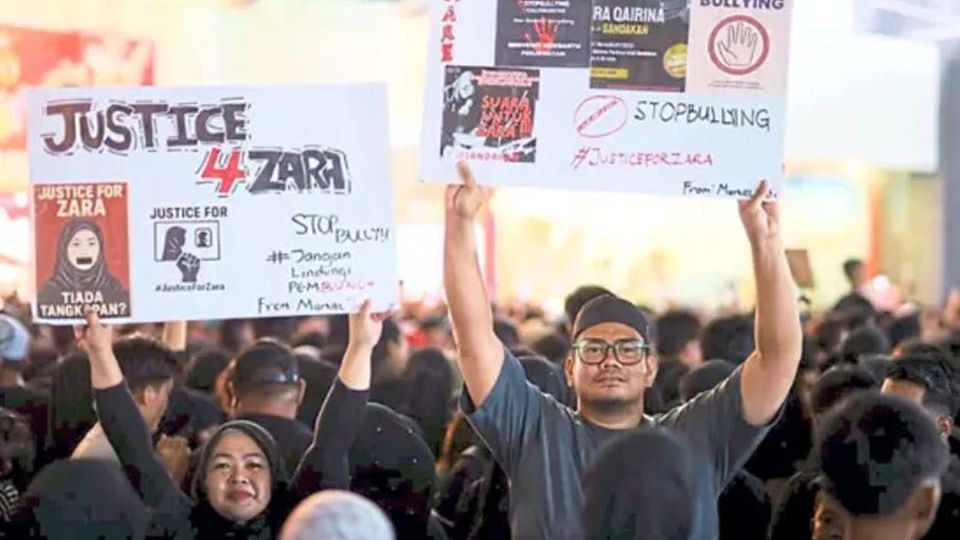August 12, 2025
KUALA LUMPUR – I used the chorus of Billy Joel’s We Didn’t Start the Fire to explain in the Sabah Politics text group I belong to that the rallies in Sabah to show solidarity with the late Zara Qairina Mahathir could quickly turn political.
Zara was a 13-year-old student at a religious boarding school in Papar, Sabah. She died on July 17 after falling from the third floor of her dormitory the day before.
Unhappy with the investigation into her death, her family has asked for a more thorough look.
Following a review of a preliminary report, the Attorney General’s Chambers (AGC) returned the case to the police for further investigation. The AGC also directed that Zara’s body be exhumed for a postmortem to check the cause of death.
This tragedy has angered a lot of people. On Friday night, thousands gathered in Sandakan and Tawau to demand justice for the teen, who might have faced bullying (though that has not been confirmed).
There were similar gatherings in Lahad Datu and Semporna, with events in Sipitang, Papar, Ranau, Kundasang, Telupid, Kudat, and Keningau scheduled over the coming days.
Some in the text group didn’t think that a solidarity gathering would turn into a political rally. It has not yet happened, I replied, but since when do politicians not jump on any opportunity to win votes?
“Think Teoh Beng Hock,” I posted, referring to the DAP political aide who was found dead on a rooftop beneath the Malaysian Anti-Corruption Commission’s Selangor office in Shah Alam on July 16, 2009, after being questioned there. That tragedy has certainly been politicised thoroughly over the years.
I asked a Ranau community leader, Japiril Suhaimin, who was organising the gathering in Kundasang today, what he thinks are the reasons for the Justice for Zara rallies. Japiril listed them:
> Demand justice for Zara and other victims who may have suffered the same fate.
> Unite the voices of the people from various districts and bring them to Kundasang as a symbol of hope and strength.
> Deliver a message to the authorities that the community will not remain silent in the face of injustice.
> Educate and raise awareness among the public about human rights, dignity, and values.
The Star reported that in Sandakan, participants carried banners, read poems, and offered prayers for Zara, while several activists and local people’s representatives addressed the gathering. In Tawau, people dressed in black held placards and chanted, “Justice for Zara” and “Stop the bullying”.
Why the big crowds showing support for Zara, I asked Sabah Bersatu Women chief Rahimah Majid.
On why the public is angry, Rahimah contended that Zara’s death is somewhat suspicious. The lawyer said the public is enraged by the authorities’ failure to carry out a proper investigation.
The police, she said, failed the most basic test of their duty: to investigate a sudden and suspicious death thoroughly, fairly, and without delay.
“For almost three weeks after Zara’s death, no meaningful investigation took place. No postmortem was conducted. Her personal belongings, including her clothing, were returned to the family without any forensic examination,” she said.
“Until today, no transparent report has been released. This is an outrageous breach of duty.”
The lawyer pointed out that there were lapses that violated Sections 329 and 300 of the Criminal Procedure Code, which clearly require a postmortem and complete investigation into any unnatural death.
“If the police had done their job properly from the start, the AGC would not need to send the file back. This is a clear sign that something is seriously wrong with the way this case has been handled,” she said.
Japiril lists his take on the reasons for the public’s anger:
> Zara died under suspicious circumstances in a school dormitory. She may have been the victim of bullying, but the initial investigation was not thorough.
> Sabahans feel this issue represents a weakness in the education system and student protection, especially in boarding schools.
Will Zara’s death become a political issue?
Japiril, who is also Sabah Progressive Party deputy president, said people’s anger over the case is growing. He listed reasons why he thinks it’s happening:
> The education system is seen as failing to protect Zara, prompting calls for reform and criticism of government agencies. People want strict action taken against bullying and negligence.
> A ban on teachers participating in rallies raises issues of freedom of speech and institutional control.
> Rallies in Tawau, Sandakan, Lahad Datu, and Kundasang show a grassroots awakening.
> People are demanding justice and questioning the use of power and access to justice.
“If this movement continues to grow, it could become a political tsunami, the people’s voice demanding accountability from those in power,” he said.
I asked Rahimah whether the Justice for Zara movement could become a political movement.
“When there’s a perceived failure by police, government agencies, or the education system, calls for justice can quickly shift from a purely humanitarian cause to a demand for systemic reform,” she said.
“This puts pressure on political leaders, especially if they are seen as slow, dismissive, or defensive. This is what is happening now.”
Joel’s iconic song begins with a list of names and things denoting issues in the public eye in the United States over four decades, until the song’s release in 1989: “Harry Truman, Doris Day, Red China, Johnnie Ray / South Pacific, Walter Winchell, Joe DiMaggio / Joe McCarthy, Richard Nixon, Studebaker, television / North Korea, South Korea, Marilyn Monroe.”
This is my Malaysian version: “Zara Qairina Mahathir, Teoh Beng Hock, Pamela Phang / Suhakam, Pastor Raymond Koh, TikTok / Amri Che Mat, MACC, Altantuya Shaariibuu, Zalina Azman.”


